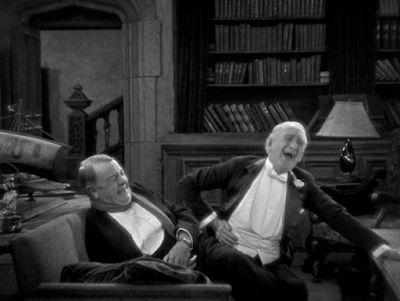This movie attracted my attention because Joan Crawford has a small role at the beginning of the film as the young Lady Catherine, who leaves a note for her husband, Lord Clive Cheney, pinned to her sleeping little boy that explains she's running off with Hughie, who was Best Man at their wedding, to pursue a life of happiness.
30 years later, the little boy, Arnold, is now all grown up and is similarly wedded to a woman who wants to take off with some handsome lothario. Before she takes the plunge, Elizabeth Cheney decides to invite her hubby's estranged mom and paramour to see how well it worked out for them, causing all sorts of amusing discomfort for everyone in the household.
Lady Catherine and Lord Porteous are riding in their motorcar as they discuss their impending visit. Lord Porteous is foul mouthed, so we get to see how bad words are bleeped out in silent movies.
It's quite shocking how Elizabeth Cheney sits on her father-in-law's lap, stroking and sticking her finger in his ear, as she tells him that his ex-wife is on the way.
When the two arrive, the youngsters seem surprised to find out that 30 years passing has made the former young lovers old, pudgy, overbearing and crotchety. Arnold has to endure lots of kissy face from his mom, after she first mistakenly believes Elizabeth's paramour, Teddy, is her boy. Elizabeth fears she and Teddy are destined to become like the bickering, aging couple.
Youth! It's just a day of spring...and gone!" -Lady Catherine
Elizabeth catches the two old lovers cuddling on the couch, reminiscing about Venice, and regains a sense of hope about her planned elopement with Teddy.
Arnold makes a play to get his wife back, and she goes to Teddy and asks what he'd do if another man tried to take her away from him. He tells her that she has two lovely eyes and he'd blacken one and close the other, as Arnold listens in. She apparently interprets his threat of abuse as evidence of true love and they passionately kiss.
Elizabeth rushes to tell the old couple that she's going to run off with Teddy just as they did, which they do.
As they are riding along, their car has some apparent trouble, and when the driver pulls over, Arnold reveals he has been posing as the chauffeur. He tells Teddy he's going to blacken one eye and close the other, and he gets in some good punches, leaving him clutching his face by the side of the road as he drives off with Elizabeth.
Lady Catherine meets Elizabeth at the door, telling her she's glad she realized her mistake and came back.
She morosely joins Arnold as they head upstairs to retire to bed, while Hughie and Clive are ready to bust a gut over the way Arnold tricked the two lovers and got his wife back.
Thoughts:
I'm not sure if that was supposed to be a happy ending or not. It's seems that Arnold is more interested in safeguarding his possession than preventing his wife from running off with another man out of any sort of love for her. His striding into the bedroom as he unties his robe at the end seems more like he's staking his claim than rekindling his romance, and Elizabeth seems doomed to live unhappily ever after in a loveless marriage.
There are some beautiful costumes and scenery to be enjoyed here, and the picture is quite clear. I enjoyed Lady Catherine's flamboyant style, and it was a tender scene when she snuggled with Hughie on the couch. The comedy is subtle as it explores the meaning of true love and marital bliss, as well as youth and old age, though I'm not completely sure what to make of it. The musical score delightfully complements the mood onscreen. It's interesting to see a film from the 1920s treat infidelity in such a cavalier manner, but it was adapted from a play by W. Somerset Maugham, who also wrote the novel The Magician was based on, which explains a lot.























No comments:
Post a Comment